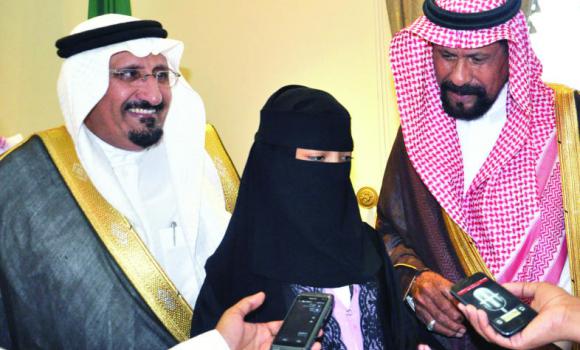
Jeddah, Sep 4: Thirteen-year-old Reham Al-Hekami, the victim of an HIV-contaminated blood transfusion at Jazan Public Hospital, returned to her hometown in the southern region on Monday after receiving intensive treatment at King Faisal Specialist Hospital in Riyadh.
Mazhara village celebrated her arrival with a large number of people, including friends and relatives, present at King Abdullah Airport in Jazan to receive her. Blood tests at reputable international laboratories have proven that she is now HIV-free, hospital sources said.
“We are extremely happy that Reham has returned to her family and friends in good health,” said Abdullah Al-Suwaid, deputy governor of Jazan, who was present at the airport to receive her.
He said Jazan Gov. Prince Mohammed bin Nasser has ordered that Reham’s family be given a house. “The governor has followed the case of Reham from the beginning,” he said.
Speaking to reporters on her arrival in Jazan, Reham said she was happy to have recovered so quickly and was looking forward to seeing her school friends. She thanked all those who prayed for her good health.
“Reham is now in good health and is in high spirits,” said her uncle Ali Al-Hekami. He thanked the government and King Faisal Hospital for the good care extended to his niece.
Reham became popular after national and international media highlighted her case.
The Ministry of Health had fired a number of officials at Jazan Public Hospital, including the hospital’s director general, medical director and laboratory and blood bank manager. The latter was also fined SR10,000.
The ministry had described the incident as a “huge mistake” and apologized to “the girl, her parents, family and Saudi society” for the pain inflicted on the girl.
People across the Kingdom expressed their happiness at the safe return of Reham from hospital. “Thank God for your safety. Mazhara village welcomes you and may God protect you from all evil,” said Abdullah Ibrahim Jahfali.
While congratulating Reham and her family, Ahmed Shehry, a Saudi, urged the government to take strict measures to end medical errors and urged hospitals and doctors to do their best to save lives. “Enough is enough for medical errors in the Kingdom,” he said.






Comments
Add new comment